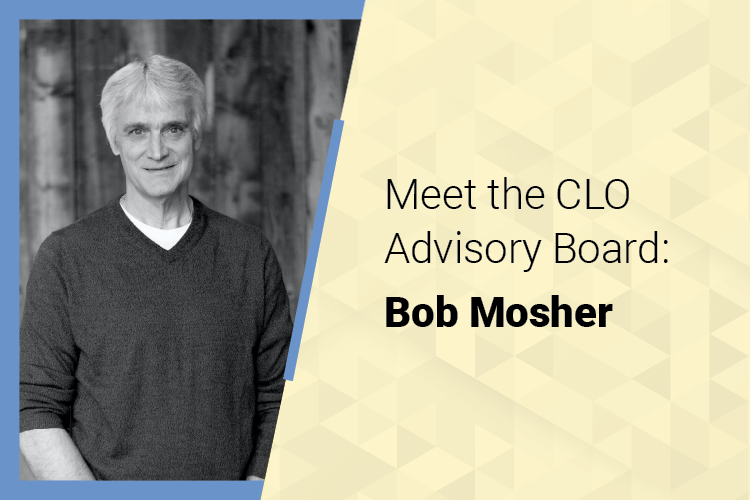
Meet longtime CLO advisory board member Bob Mosher, CEO and chief learning evangelist for APPLY Synergies.
by Elizabeth Loutfi-Hipchen
April 22, 2021
 Chief Learning Officer recently sat down with Bob Mosher, CEO and chief learning evangelist for APPLY Synergies. Mosher has held numerous senior learning and development positions during his 30 years in the industry, including chief global learning evangelist for Ontuitive, former director of learning strategy and evangelism for Microsoft and executive director for Element K (now Skillsoft).
Chief Learning Officer recently sat down with Bob Mosher, CEO and chief learning evangelist for APPLY Synergies. Mosher has held numerous senior learning and development positions during his 30 years in the industry, including chief global learning evangelist for Ontuitive, former director of learning strategy and evangelism for Microsoft and executive director for Element K (now Skillsoft).
Chief Learning Officer: Where is your hometown?
I’m from a small town in Western New York called Lockport, New York, which is a suburb just north of Buffalo. I don’t think people know about it outside of New York. There’s a canal that goes from one end of the state to the other, and it was built back when the donkeys pulled boats. Lockport is the largest rise and fall in the locks of that canal.
CLO: How did you first become interested in learning and development?
I backed into it. My pedigree is in elementary education. I was an elementary school teacher for five years. I followed the footsteps of my mom and my sister who are educators. Truth be known, I was an absolutely horrific student, but I got into it because I so admired them and felt a calling to that work. I wanted to fix the system, so to speak, and make it a little more fun or engaging for learners who were a lot like me.
Then I got my degree in computer education — as we called it back then — and stumbled into adult education on the computer side when the desktop PC first hit. There was a mad rush toward literacy and onboarding folks in that. I had just finished my master’s and found this wonderful small startup company called Logical Operations, and left public education to do that job. That’s gotten me here. I didn’t look back after that, and got deeper and deeper into design, adult learning and theory, and found my way to where I am today.
I always say some of our better clients and some of the best CLOs I’ve ever met didn’t come from education. They came from the business, but they had a passion for learning and a passion for development. Most managers are held to professional development of their people. But these folks feel called into that side of it and because they have such great understanding of the business, they make great learning leaders and are super dedicated to the craft.
CLO: What lessons did you learn back in 2020 that you’ve taken with you into 2021?
For me, it’s the art of listening. As educators, we’re supposed to have answers and we’re supposed to be the owners of content and the developers of programs. We get help from the business, but we’re very locked in our ways. Understandably so, but all of our ways were thrown out last year. My instinct, and many, was to rush to solution, rush to help. That was fairly humbling for me. It was a year to reflect and sit back and examine my commitment to things over doing the right thing. It taught me that — which L&D should do well anyway, but when you get senior like me and you’ve done it a bunch of times — you guess people’s right answer, or think you can. Because there was no normal and we weren’t making courses like we always used to, it was a year of reflection and listening for me to kind of rekindle that skill.
CLO: Where do you think we’re headed in terms of learning technology and that relationship between technology and L&D?
A good friend of mine said that the pandemic has exposed cracks in the dam in a lot of things that we were forcing into L&D. Technology is one that has taken a bit of a hit. Virtual, which we all rushed to — and had to — is going to change the landscape forever. The interesting thing will be, when the dust settles a bit, how well are we doing it? Another good friend of mine at Microsoft said, “Methodology begets technology, not the other way around.” I can’t tell you, in my 38 years of this, how many times I rushed at a technology after a trade show or a keynote talk or a great pitch from a vendor and thought, “The next coming of learning.” And then I realized that it’s a hammer looking for a nail.
Things like virtual instruction and other technologies that the pandemic has sped to market used to sit on desks, or request forms or IT in backlog forever. All of a sudden, we had to stand up something Zoom-like in three weeks and “Oh, by the way, write a course for it.” When we can look up from our desks a bit to the horizon, I think it’ll be interesting to see where virtual learning lands in the blend.
The other thing I think that’s going to come on very strong — and I have a bias to this I’ll be the first to admit — is embedded learning. Embedded systems that help people in the workflow were, again, a nice-to-have and on everyone’s lists. Because we don’t go into buildings anymore, we don’t have our natural support systems, we don’t have collaborative, face-to-face things like we used to, I think the learner has felt more isolated and alone in their work. We can hop on Zoom in seconds, but when the Zoom call ends, you’re sitting in your house by yourself. Electronic performance support systems, adaptive learning systems — these kinds of adaptive, contextualized, embedded systems are going to come out of this in a powerful way.
CLO: How do you enjoy spending your time outside of work?
Easy one. I’m a grandfather. I adore my grandkids. I have two new ones, so I’m new at this, but it’s just a complete rebirth for me. Close behind is my family and my children who’ve grown into these wonderful adults that I so enjoy being around. And then golf. I’m not good at it, but I love the sport. It does something for me mentally and physically that’s just wonderful. It’s so not like anything else I do in my life. Boating of all things would probably be last among many. But again, same thing, it’s just a great escape for me and it was wonderful during the pandemic.
CLO: What book, either audio or physical, or podcast has gotten you through the pandemic?
I don’t know if my peers will scoff at me, but I spend my entire day immersed in research, work and blogging that for me, to get personally through the pandemic — I like science-fiction, believe it or not — there’s a wonderful series called the Dragon School that I’ve buried myself in. It’s been a remarkable, not-COVID, not-like-anything kind of series.
CLO: In your opinion, what are some components of a robust learning and development program?
It’s my 38th year in this, and I think a robust L&D program has to take into account both the formal and the informal domain. For too long, we’ve staked our flag, resources and money in the formal side. I get why. It’s controllable and scalable. And in many cases, it’s our pedigree. But in the last 10 years of my own work, I’ve realized there’s classic numbers thrown around called the 70-20-10. Whether you agree with the numbers or not, what it principally says is that if you look at the time that L&D is allowed to take people out of work to learn, we get them for a fraction of their time. Myopically, in the average small-to-medium-sized business that does large enterprise, an employee gets 40 hours of formal instruction a year. That’s a week. They’re in the workflow for 51 others, or, if you take holidays out, 40-something. Where does our robust learning program help there? Any good program, in my opinion, understands that we need to equally be in the informal domain intentionally than we are in the formal domain, if not more so. And there are tools and methodologies to do that. It’s not as common to us or our industry, but COVID changed that whole game. The programs that are successful understand that they have to be throughout the journey for a learner, and the majority of that is done on the job. Too often, we’ve pivoted on things that we control. The learning programs I’ve seen that are successful understand that there’s a much bigger world we have to be a part of.
CLO: What advice do you have for CLOs and fellow learning leaders as they continue to take on 2021?
We have to be careful of assuming anything coming out of this. The layers of the onion that have changed because of this: from the learners’ disposition, from their level of self-efficacy, from their intrinsic and extrinsic support systems, their jobs, their roles, the collegial dynamic of hybrid workplaces, and some working out of the home for maybe the rest of their professional. My gosh, all of those do not fit into the world we used to oversee before this started. When we come out of this, we’re in the learning business, and that means we are learners too. We need to host learning conversations, not about content per se yet. What is this brave new world of performance that we’re supposed to be able to enable? We’re not in the content business. We are in the workflow-enablement business, and the workflow right now is screwed up. We can play a very important role in helping organizations with analysis and understanding of what that new world is, and it’s going to take 2022 and beyond to figure that out.
ALSO READ: More articles by Mosher, including his CLO magazine column, Selling Up, Selling Down.
This article was edited for brevity.




